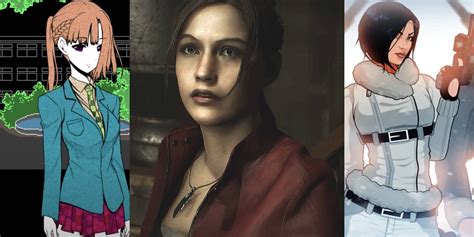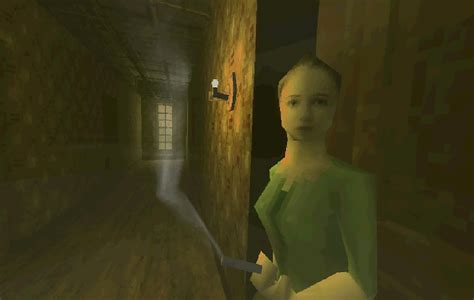Breaking News


Popular News


Explore the representation and evolution of female protagonists in horror games, their challenges and stereotypes faced, and the empowerment through character development. Discover the impact on players and the future ahead.When it comes to horror games, the protagonists are often strong, resilient, and determined individuals who must face terrifying challenges. In recent years, there has been a noticeable shift towards more female representation in horror games, with women taking on the lead roles and showcasing their strength in the face of fear. In this blog post, we will explore the evolving representation of female protagonists in horror games, the challenges and stereotypes they face, and the impact they have on players. We will also delve into the empowering character development of these women and discuss the future of women in horror games. Join us as we celebrate the women who defy expectations and inspire us through their bravery and resilience in the world of horror gaming.
Contents

Representation in Horror Games
When it comes to representation in horror games, the industry has come a long way in terms of providing a more diverse cast of characters. In earlier games, female protagonists were often portrayed as helpless victims, relying on male characters to save them. However, as the industry has evolved, we have seen a shift towards more empowered and complex female characters taking center stage in horror games.
One example of this shift can be seen in the evolution of female protagonists in survival horror games. Characters like Jill Valentine from the Resident Evil series and Heather Mason from Silent Hill have become iconic figures in the gaming world, showcasing strength, resilience, and intelligence in the face of terrifying challenges. This shift in representation has allowed for a more inclusive and relatable gaming experience for female players, who can now see themselves reflected in the characters they control.
In addition to the positive impact on players, the inclusion of strong and independent female protagonists in horror games has also helped to challenge the stereotypes and gender norms often associated with the genre. By subverting traditional tropes and expectations, these characters have paved the way for a more diverse and progressive representation of women in gaming, ultimately contributing to a more inclusive and empowering gaming landscape.

Evolution of Female Protagonists
When we look at the history of horror games, we can see a noticeable evolution in the portrayal of female protagonists. In the early days of gaming, female characters were often relegated to the role of damsel in distress, waiting to be rescued by the male hero. However, as the gaming industry has grown and diversified, we have seen a shift in the representation of women in horror games.
Female protagonists in modern horror games are no longer mere victims or side characters. They are now taking center stage as complex and resourceful characters who drive the narrative forward. These characters are often empowered through their character development, facing their fears and challenges head-on, and emerging as resilient and courageous heroes.
It is important to celebrate the evolution of female protagonists in horror games, as it reflects the progress that has been made in the gaming industry in terms of inclusivity and representation. By portraying women as strong and capable protagonists, game developers are challenging stereotypes and providing players with a more diverse and dynamic gaming experience.

In the world of horror games, female protagonists often face numerous challenges and stereotypes. From the portrayal of women as helpless victims to the lack of strong and independent female characters, there are many obstacles that women in horror games must overcome. These challenges not only affect the portrayal of women in the games themselves, but also impact the experiences of female players who may not see themselves represented in a positive light.
One of the most pervasive stereotypes faced by female characters in horror games is the damsel in distress trope. Often, female characters are portrayed as weak and in need of rescue, perpetuating the idea that women are helpless and incapable of defending themselves. This not only limits the character development of female protagonists, but also reinforces harmful gender stereotypes that can have a lasting impact on players.
Another challenge faced by female protagonists in horror games is the lack of agency and empowerment. Many female characters are sidelined in favor of male protagonists, or are given limited opportunities to showcase their strengths and abilities. This can leave female players feeling marginalized and overlooked, as they may not see themselves reflected in the games they play.
Despite these challenges and stereotypes, there is a growing movement within the gaming industry to create more diverse and empowering female characters in horror games. By challenging traditional gender norms and embracing the complexity and strength of female protagonists, game developers are paving the way for a more inclusive and representative gaming experience for all players.

Female protagonists in horror games have come a long way in terms of character development. As the gaming industry continues to evolve, there has been a significant shift in the portrayal of women in horror games. Characters are no longer just damsels in distress or the stereotypical femme fatale; they are now empowered individuals with unique traits and personalities.
The evolution of female protagonists in horror games has played a crucial role in challenging traditional gender stereotypes. These characters are not only capable of facing the horrors within the game, but they also serve as role models for players, both male and female. By breaking free from the stereotypes, female protagonists have shown that they can be just as resilient, resourceful, and courageous as their male counterparts.
The representation of strong and independent female characters in horror games has had a profound impact on players. Through character development, players are able to witness the growth and empowerment of these protagonists, which can be inspiring and empowering in itself. As players immerse themselves in the game, they can identify with the struggles and triumphs of the characters, fostering a sense of empowerment and resilience.
Overall, the empowerment of female protagonists through character development has not only enriched the storytelling aspect of horror games but has also contributed to the positive representation of women in the gaming industry. As the industry continues to progress, it is crucial to celebrate the diversity and strength of female characters in horror games, paving the way for a more inclusive and empowering gaming experience for all.

When it comes to horror games, female protagonists play a crucial role in shaping the player experience. With the rise of strong and dynamic female characters in the gaming industry, players are being exposed to a different kind of storytelling and gameplay. These characters are challenging traditional gender roles and stereotypes, and this has a significant impact on the players, both male and female.
The presence of empowered female protagonists in horror games can have a profound effect on players. It can inspire and empower female players, showing them that they can be the heroes of their own stories. It can also challenge male players to reconsider their perceptions of women and their capabilities. By experiencing the journey of these female characters, players are forced to confront their own biases and preconceptions.
Furthermore, the impact of female protagonists extends beyond the game itself. It can shape the broader gaming community and industry. When players engage with well-developed female characters, it can influence their expectations and desires for future games. This, in turn, can lead to a more diverse and inclusive gaming landscape that caters to a wider audience.
In conclusion, the impact of female protagonists on players in horror games is undeniable. These characters have the power to inspire, challenge, and shape the experiences of players, ultimately contributing to a more vibrant and inclusive gaming community.

As the gaming industry continues to expand and diversify, the future of women in horror games looks promising. With the increasing demand for more diverse and inclusive content, there is a growing opportunity for female protagonists to take center stage in the horror genre. The role of women in horror games is evolving, with developers recognizing the importance of creating compelling and empowering female characters.
One of the key aspects of the future of women in horror games is the representation and portrayal of female characters. It is essential for developers to move away from stereotypical and one-dimensional portrayals of women in horror games. By challenging traditional gender roles and stereotypes, female protagonists can become more relatable and empowering to players of all genders.
Furthermore, the future of women in horror games lies in the hands of both developers and players. It is crucial for developers to listen to the feedback and demands of players, as well as to create spaces for diverse voices and experiences. By actively involving women in the development and production of horror games, the industry can work towards more authentic and inclusive narratives.
Ultimately, the future of women in horror games depends on the willingness of the gaming industry to embrace change and push for more diverse and representative content. By celebrating and empowering female protagonists, horror games have the potential to create impactful and immersive experiences for players of all backgrounds.

Why is it important to celebrate female protagonists in horror games?
It is important to celebrate female protagonists in horror games because it helps to break gender stereotypes and provide more diverse representation in the gaming industry. It also allows for more inclusive and relatable storytelling for all players.
Can you give examples of successful female protagonists in horror games?
Some examples of successful female protagonists in horror games include Lara Croft from Tomb Raider, Heather Mason from Silent Hill 3, and Ellie from The Last of Us.
What challenges do female protagonists face in horror games?
Female protagonists in horror games often face challenges related to stereotypical gender roles, objectification, and unrealistic physical abilities. These challenges can impact the character’s development and the overall gaming experience.
How can the portrayal of female protagonists in horror games impact players?
The portrayal of female protagonists in horror games can impact players by providing them with more diverse and relatable characters to connect with. It can also challenge players to think critically about gender representation and stereotypes in the gaming industry.
What are some unique traits and characteristics of female protagonists in horror games?
Some unique traits and characteristics of female protagonists in horror games include resilience, resourcefulness, and the ability to navigate and survive terrifying situations. These characters often showcase strength and determination in the face of adversity.
How have female protagonists in horror games evolved over time?
Female protagonists in horror games have evolved over time to become more complex, multi-dimensional, and empowered characters. They have challenged traditional gender roles and have become central figures in the horror gaming genre.
What can the gaming industry do to further promote female protagonists in horror games?
The gaming industry can further promote female protagonists in horror games by investing in diverse storytelling, character development, and representation. It can also support and elevate female game developers and creators to bring more unique perspectives and experiences to the genre.